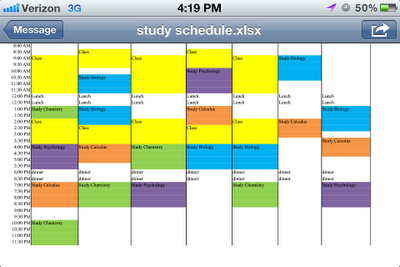It’s crunch time! Final
exams for the Spring 2012 semester start Monday, May 14. If you haven’t begun
preparing, it’s definitely time! With
all of the projects, presentations, quizzes and pre-final exams leading up to
that week, this can be a pretty overwhelming time in the semester. While the idea of studying for several massive exams can be daunting, it's very possible to soar through it! I am
going to provide you with some time tested tips to help you be as successful as
possible on your final exams!
Plan and organize
your time!
Success on finals has nothing to do with luck; it's mostly about being organized and properly managing your time. You can break down your organization to make it more manageable:
- Find out how many final exams you have. Not every professor gives a final.
- Consult the Final Exam Schedule to determine when your finals will take place. This can give you a starting point for determining what your week looks like. Are all your finals at the beginning or the end of the week? Are they spread out? When will your most challenging finals take place?
- Determine if you are missing any resources. Do you have all lecture notes, texts and handouts? Examine the syllabus or consult any study guides to ensure you have everything you need! Do you need a tutor, time with your professor or a study group to help you succeed?
- Determine and make a list of what tasks you need to perform to prepare for each exam. Do you need to:
- Skim through chapters in your textbook?
- Reread some chapters that are less clear to you?
- Study your notes or your professors PowerPoint slides?
- Memorize certain processes, vocabulary, dates, formulas, etc? Develop an understanding of certain concepts?
- Determine how many hours you need to spend devoted to preparation for each exam. Not all exams are equal. Some may have more weight in the calculation of your grade and some may be more challenging for you. Consult your preparation list for each class and determine roughly how many hours you need for each task.
- Create a study schedule for the next two weeks:
Plan your study time in blocks and have a goal for each block of time. This will help you be more directed during your study.
Don't study harder; study smarter!
Success on finals isn't about staying up in your dorm room until 4am. It's not about marathon cram sessions that leave your brain feeling like jelly. It's about studying smartly.
- Take Breaks! Even the most dedicated student can only truly concentrate for about an hour at a time. Set a timer and step away from your books for ten minutes every hour or so. You may feel the pressure to keep studying, but you will be much more effective at learning and remembering if you take frequent short breaks!
- Eliminate Distractions! Not everyone can stand the silence of the library but it might be preferable to your distraction filled dorm room. If you are trying to study while watching TV, looking at Facebook or texting, you probably will spend dozens of hours at your desk without reaping any benefits. It's better to shelve these things during your studying time and save them for your break!
- Study in groups! There's strength in numbers! Studying in groups is helpful because it allows you to try out difficult material or to ask questions. If you find a study group that you can trust, consider dividing up the work and writing study guides for each other. This can help everyone make the most of their study time.
Preparing for final exams can be an exhausting and overwhelming experience. If you are kind to yourself, you will be capable of learning and retaining more! If you allow yourself to become too stressed or do not consider your health, you may get sick. Consider the following:
- Get plenty of sleep! You will lose effectiveness if you do not get enough rest.
- Eat right! Nutrition is even more important during stressful times!
- Take breaks and don't overdo it!
- Do something fun and relaxing everyday! This will help you destress which will enable you to be more focused!
CAS Academic Advisor
katherine.robinson@scranton.edu


No comments:
Post a Comment